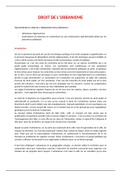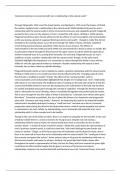Socialism 9 Markers
Explain and analyse 3 ways socialist thinkers have viewed the economy
Most socialist thinkers advocate for the abolition of capitalism. The end goal of all socialists is an economy
based around collectivisation and equality. Despite this, third-way socialist thinker Anthony Giddens believes
that there is no need in the removal of capitalism.
Fundamentalist socialist Fredrich Engels and Karl Marx seek to replace capitalism with a system based on full
equality and collectivisation following the withering away of the state succeeding the dictatorship of the
proletariat. Karl Marx sets out in his Communist Manifesto (1848) that capitalism has installed a fall
consciousness into society, one that had originally been cooperative, selfless, and fraternal and now very
different. Marx also points out that Human nature had been contaminated by the prevailing economic system -
capitalism - which encouraged selfishness, ruthlessness, and greed. And for that reason, they seek to destroy
capitalism with a violent revolution led by the proletariat. Marx and Engels ideas of a collectivised economy
later inspired fundamentalist socialists like Ralph Miliband (1924-94) and Tariq Ali (1943-) who ridiculed the
'parliamentary socialism' championed by organisations like the labour party and argued for a more Marx stance
on the economy.
Evolutionary socialist Beatrice Webb also sought to destroy capitalism and replace it with a collectivised
economy. However, she differed from Marx on the grounds on evolution rather than an immediate need for
revolution. She felt like legislation could be passed in order for society to naturally evolve to capitalism being
abolished and being replaced by a more socialist, equal system, where wealth was spread equally among the
masses. Webb articulated in her seminal work ‘the minority report of the poor law commission’ (1909) that
capitalism was creating 'crippling poverty and demeaning inequality' in society and a 'corrupting force' for
humanity, fostering 'unnatural' levels of avarice and selfishness among men and women. As a result, much of
what Webb demanded in her minority report of the poor law commission 1909 was included in the 1942
Beveridge report, Webb’s ideas and suggestions of the inequalities capitalism created pre-dated the legislation
that was passed in 1942.
Finally, third way socialist thinker Anthony Giddens articulated a very different view from other socialist
thinkers. He believed that capitalism had a part to play in society and should therefore be kept, which is where
Anthony Giddens differs from other socialist thinkers. He argued that the survival of social democracy required
the recognition that free-market capitalism had an unmatched capacity to empower individuals economically
and for that reason capitalism should be maintained. Giddens felt that capitalism worked best with a strong
sense of social cohesion. Gidden’s recognised the strength of other ideologies in the 20th century and for that
reason argued that in order to make centre-left socialism more popular one would have to recognise free-market
capitalism but with a strong sense of social cohesion as well. Giddens’ arguments strongly influenced the New
Labour governments of Tony Blair and Gordon Brown and the German SPD, led by Gerhard Schröder.
Gidden’s Third Way (1998) defines a very different stance on the economy to other socialist thinkers,
representing the change to society in the 20th and 21st century.
Explain and analyse 3 ways in which socialist thinkers have viewed human nature [9]
All socialists believe that human nature is malleable and improvable, but they disagree on to what extent it
needs improving and how.
Fundamentalist socialist Karl Marx sees human nature as originally fraternal and altruistic. He believes that the
collective has been contaminated by capitalism, with it installing the ‘false consciousness’ of bourgeoise values
into them. He believes that human nature is not fixed, but the ensemble of social relations. He argues that this
damage capitalism has inflicted on society, can be repaired by revolutionary socialism and the dictatorship of
the proletariat, which will eventually overthrow capitalism and replace with collectivism, which at this point
Explain and analyse 3 ways socialist thinkers have viewed the economy
Most socialist thinkers advocate for the abolition of capitalism. The end goal of all socialists is an economy
based around collectivisation and equality. Despite this, third-way socialist thinker Anthony Giddens believes
that there is no need in the removal of capitalism.
Fundamentalist socialist Fredrich Engels and Karl Marx seek to replace capitalism with a system based on full
equality and collectivisation following the withering away of the state succeeding the dictatorship of the
proletariat. Karl Marx sets out in his Communist Manifesto (1848) that capitalism has installed a fall
consciousness into society, one that had originally been cooperative, selfless, and fraternal and now very
different. Marx also points out that Human nature had been contaminated by the prevailing economic system -
capitalism - which encouraged selfishness, ruthlessness, and greed. And for that reason, they seek to destroy
capitalism with a violent revolution led by the proletariat. Marx and Engels ideas of a collectivised economy
later inspired fundamentalist socialists like Ralph Miliband (1924-94) and Tariq Ali (1943-) who ridiculed the
'parliamentary socialism' championed by organisations like the labour party and argued for a more Marx stance
on the economy.
Evolutionary socialist Beatrice Webb also sought to destroy capitalism and replace it with a collectivised
economy. However, she differed from Marx on the grounds on evolution rather than an immediate need for
revolution. She felt like legislation could be passed in order for society to naturally evolve to capitalism being
abolished and being replaced by a more socialist, equal system, where wealth was spread equally among the
masses. Webb articulated in her seminal work ‘the minority report of the poor law commission’ (1909) that
capitalism was creating 'crippling poverty and demeaning inequality' in society and a 'corrupting force' for
humanity, fostering 'unnatural' levels of avarice and selfishness among men and women. As a result, much of
what Webb demanded in her minority report of the poor law commission 1909 was included in the 1942
Beveridge report, Webb’s ideas and suggestions of the inequalities capitalism created pre-dated the legislation
that was passed in 1942.
Finally, third way socialist thinker Anthony Giddens articulated a very different view from other socialist
thinkers. He believed that capitalism had a part to play in society and should therefore be kept, which is where
Anthony Giddens differs from other socialist thinkers. He argued that the survival of social democracy required
the recognition that free-market capitalism had an unmatched capacity to empower individuals economically
and for that reason capitalism should be maintained. Giddens felt that capitalism worked best with a strong
sense of social cohesion. Gidden’s recognised the strength of other ideologies in the 20th century and for that
reason argued that in order to make centre-left socialism more popular one would have to recognise free-market
capitalism but with a strong sense of social cohesion as well. Giddens’ arguments strongly influenced the New
Labour governments of Tony Blair and Gordon Brown and the German SPD, led by Gerhard Schröder.
Gidden’s Third Way (1998) defines a very different stance on the economy to other socialist thinkers,
representing the change to society in the 20th and 21st century.
Explain and analyse 3 ways in which socialist thinkers have viewed human nature [9]
All socialists believe that human nature is malleable and improvable, but they disagree on to what extent it
needs improving and how.
Fundamentalist socialist Karl Marx sees human nature as originally fraternal and altruistic. He believes that the
collective has been contaminated by capitalism, with it installing the ‘false consciousness’ of bourgeoise values
into them. He believes that human nature is not fixed, but the ensemble of social relations. He argues that this
damage capitalism has inflicted on society, can be repaired by revolutionary socialism and the dictatorship of
the proletariat, which will eventually overthrow capitalism and replace with collectivism, which at this point








